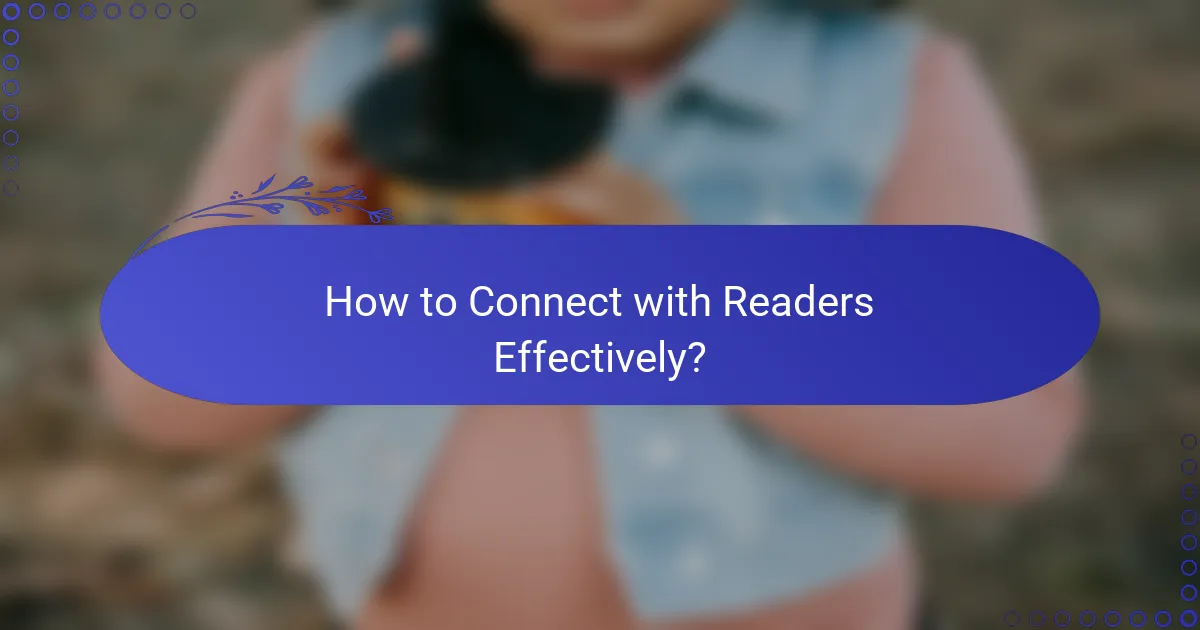Establishing a strong author brand is essential for independent writers looking to connect with their audience and differentiate themselves in a competitive market. This involves crafting a unique identity, optimizing your online presence, and actively engaging with readers to foster community. By understanding your audience and employing effective market positioning strategies, you can create meaningful connections that resonate and endure. For insights on building a loyal reader base, consider exploring its advantages and limitations.

How to Build Your Author Brand?
Building your author brand involves establishing a distinct identity that resonates with your target audience and sets you apart in the market. This process requires a combination of defining your voice, creating an online presence, and engaging with readers effectively.
Define your unique voice
Your unique voice is the essence of your writing style and personality. It should reflect your values, themes, and the emotions you want to convey through your work. Take time to analyze what makes your writing distinct and how it connects with your intended audience.
Consider creating a voice chart that outlines key characteristics of your style, such as tone, vocabulary, and themes. This can serve as a guide to maintain consistency across your works.
Create a professional website
A professional website acts as your online portfolio and is crucial for establishing credibility. It should include information about your books, a blog for updates, and contact details for readers and industry professionals.
Ensure your website is user-friendly and visually appealing. Use a clean layout, easy navigation, and mobile responsiveness to enhance user experience. Consider integrating an email newsletter sign-up to build your mailing list.
Utilize social media platforms
Social media platforms are powerful tools for connecting with readers and promoting your work. Choose platforms that align with your audience, such as Instagram for visual storytelling or Twitter for quick updates and engagement.
Regularly share content that reflects your brand, such as writing tips, behind-the-scenes glimpses, or personal anecdotes. Engage with followers by responding to comments and participating in relevant conversations.
Engage with your audience
Engagement is key to building a loyal readership. Interact with your audience through comments, emails, and social media messages to create a sense of community. Host Q&A sessions or live readings to foster direct connections.
Consider creating a reader group or forum where fans can discuss your work and share their thoughts. This not only strengthens relationships but also provides valuable feedback for your future projects.
Develop a consistent visual identity
Your visual identity includes your logo, color scheme, and overall aesthetic, which should be consistent across all platforms. This helps reinforce your brand and makes it easily recognizable.
Invest in professional design services if needed, or use online tools to create cohesive graphics. Ensure that your visual elements reflect the themes and tone of your writing, enhancing the overall brand experience for your readers.

What Strategies Enhance Market Positioning?
Effective market positioning for independent authors involves understanding your audience, analyzing competitors, optimizing for search engines, and building relationships with influencers. These strategies help create a strong personal brand that resonates with readers and stands out in a crowded marketplace.
Identify target readership
Identifying your target readership is crucial for effective market positioning. Start by defining demographics such as age, gender, interests, and reading habits. Conduct surveys or engage with readers on social media to gather insights about their preferences.
Once you have a clear picture of your audience, tailor your content and marketing strategies to meet their needs. For instance, if your readers prefer thrillers, focus on creating suspenseful narratives and engaging promotional materials that highlight those elements.
Analyze competitor branding
Analyzing competitor branding helps you understand what works in your genre and identify gaps in the market. Look at successful authors in your niche and assess their branding elements, including cover design, social media presence, and reader engagement strategies.
Take note of their strengths and weaknesses. This analysis can inform your own branding decisions, allowing you to differentiate yourself. For example, if competitors focus heavily on social media, consider alternative platforms like podcasts or newsletters to reach your audience effectively.
Leverage SEO for visibility
Search engine optimization (SEO) is essential for increasing your visibility as an independent author. Start by researching relevant keywords that potential readers might use to find books in your genre. Incorporate these keywords into your website, blog posts, and book descriptions to improve search rankings.
Additionally, consider creating content that answers common questions or topics of interest related to your writing. This not only enhances your SEO but also establishes you as an authority in your field, attracting more readers to your work.
Collaborate with influencers
Collaborating with influencers can significantly boost your market positioning. Identify influencers in your genre who have a strong following and align with your brand values. Reach out to them for potential partnerships, such as guest blog posts, social media takeovers, or joint giveaways.
These collaborations can introduce your work to new audiences and enhance your credibility. Ensure that any partnership feels authentic and mutually beneficial to foster a genuine connection with their followers.

How to Connect with Readers Effectively?
Connecting with readers effectively involves engaging them through various interactive methods that foster a sense of community and belonging. By utilizing strategies such as virtual book readings, exclusive content offerings, and active participation in online communities, authors can build lasting relationships with their audience.
Host virtual book readings
Virtual book readings are an excellent way to connect with readers in real-time. These events allow authors to showcase their work, share insights, and interact directly with their audience. Platforms like Zoom or Facebook Live can facilitate these readings, making it easy to reach a global audience.
Consider scheduling readings at different times to accommodate various time zones. Promote the event through social media and email newsletters to maximize attendance. Engaging with your audience during the reading by answering questions can enhance the experience and deepen connections.
Offer exclusive content
Providing exclusive content is a powerful way to reward loyal readers and entice new ones. This could include behind-the-scenes insights, early access to new releases, or special short stories. Exclusive content creates a sense of privilege and belonging among your readers.
Consider using platforms like Patreon or your own website to distribute this content. Offering tiered memberships can also incentivize readers to support you financially while gaining access to unique materials. Keep the content fresh and varied to maintain interest over time.
Encourage reader feedback
Encouraging reader feedback is crucial for understanding your audience’s preferences and improving your work. Create opportunities for readers to share their thoughts through surveys, comment sections, or social media platforms. This not only shows that you value their opinions but also fosters a two-way relationship.
Responding to feedback, whether positive or negative, can further strengthen your connection with readers. Consider implementing changes based on their suggestions to demonstrate that their input matters. Regularly ask for feedback after book releases or events to keep the dialogue open.
Participate in online communities
Engaging in online communities related to your genre or interests can significantly enhance your visibility and connection with readers. Platforms like Goodreads, Facebook groups, or specialized forums allow authors to interact with potential readers and fellow writers.
Be active in discussions, share valuable insights, and promote your work subtly without being overly self-promotional. Building genuine relationships in these communities can lead to organic support and word-of-mouth recommendations. Remember to respect community guidelines and contribute positively to the conversations.

What Tools Support Author Branding?
Effective author branding relies on a variety of tools that enhance design, communication, and online presence. Utilizing the right platforms can help you create a cohesive identity, engage with readers, and manage your content efficiently.
Canva for design
Canva is a user-friendly graphic design tool that allows authors to create visually appealing marketing materials, including book covers, social media posts, and promotional graphics. Its drag-and-drop interface and extensive library of templates make it accessible for those without a design background.
When using Canva, focus on maintaining a consistent color palette and typography that reflects your personal brand. This consistency helps in building recognition among your audience. Consider using Canva’s brand kit feature to store your colors and fonts for easy access.
Mailchimp for email marketing
Mailchimp is a powerful email marketing platform that enables authors to build and manage their mailing lists. It allows you to send newsletters, announcements, and promotional emails directly to your readers, fostering a strong connection with your audience.
To maximize Mailchimp’s effectiveness, segment your audience based on their interests or engagement levels. This targeted approach can lead to higher open and click-through rates. Additionally, ensure your emails are mobile-friendly, as many users access their emails on smartphones.
WordPress for website management
WordPress is a versatile content management system that allows authors to create and maintain their own websites. It offers a range of themes and plugins tailored for authors, making it easy to showcase your work and connect with readers.
When setting up your WordPress site, prioritize user experience by ensuring fast loading times and easy navigation. Regularly update your content to keep your audience engaged and improve your site’s SEO. Consider integrating social media links and a blog to enhance interaction with your readers.

What Are the Key Metrics for Success?
Key metrics for success as an independent author include website traffic, social media engagement, and reader feedback. These metrics help gauge your market positioning and the effectiveness of your branding efforts.
Website traffic analysis
Website traffic analysis involves tracking the number of visitors to your author website and understanding their behavior. Key metrics include unique visitors, page views, and average session duration. Tools like Google Analytics can provide insights into which pages attract the most attention and how visitors navigate your site.
To improve your website traffic, focus on search engine optimization (SEO) and content marketing. Regularly updating your blog with relevant content can draw in readers and keep them engaged. Aim for a steady increase in traffic over time, ideally targeting a growth rate of 10-20% monthly for new authors.
Social media engagement rates
Social media engagement rates measure how actively your audience interacts with your content across platforms like Facebook, Twitter, and Instagram. Metrics to consider include likes, shares, comments, and overall reach. High engagement rates indicate that your content resonates with your audience and can enhance your visibility.
To boost engagement, post consistently and interact with your followers. Use a mix of promotional content, behind-the-scenes insights, and reader polls to keep your audience interested. Aiming for an engagement rate of 1-5% is a good benchmark for most social media platforms.
